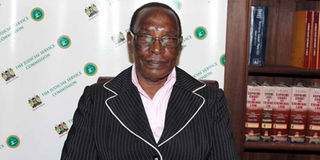Judge says women should show contribution to marriage

Lady Justice Roselyn Nambuye before the Judicial Service Commission's panel interviewing candidates for the position of deputy Chief Justice at the Supreme Court building in Nairobi on October 4, 2016. PHOTO | DENNIS ONSONGO | NATION MEDIA GROUP
What you need to know:
Court of Appeal judge Roselyn Nambuye told the Judicial Service Commission that most women these days are either in employment or do business and as such should show what property or percentage they have contributed.
She was responding to Commissioner Mercy Deche, who inquired about the Lands Act that was amended on spousal interests regarding land ownership, and which also excluded the presumption of joint tenancy.
A judge aspiring to become the Deputy Chief Justice on Tuesday said women should move away from the idea of joint ownership of property in marriage and instead show their contributions to the union.
Court of Appeal judge Roselyn Nambuye told the Judicial Service Commission that most women these days are either in employment or do business and as such should show what property or percentage they have contributed.
She was responding to Commissioner Mercy Deche, who inquired about the Lands Act that was amended on spousal interests regarding land ownership, and which also excluded the presumption of joint tenancy.
“Gone are the days when women were viewed as joyriders in marriages. Women should show what they have contributed to marriage since these days most of them are in employment or are doing something,” she said.
“If there is a dispute, then women should go to court and be able to stand up and fight for their rights,” she added.
Commissioner Mohammed Warsame also pointed out that after every general elections, the IEBC and courts were always blamed by disappointed aspirants and asked Justice Nambuye what she would do to correct the same.
Justice Nambuye, who was also interviewed for the position of Chief Justice last month, said that courts should be able to declare a winner, be it the President or MCA, in an election petition where evidence is openly glaring and a court has subjected the case to scrutiny including recounting of votes.
‘A DECLARATION’
“Where evidence shows, the court has to rule and give a declaration. Yes, I would advocate that courts declare the winners,” she said.
She added: “The IEBC should avoid situations where they attract criticism and be well prepared and transparent in their work. The Judiciary should also keep pace, the decisions we churn out should be sound,” she said.
The judge noted she would advocate for the use of traditional dispute resolution methods to solve conflicts involving families and communities.
“The elders who resolve such conflicts usually know both parties well and what they stand for. It is also easier to mobilise the extended family at this stage to help in solving the matter,” she said. She would, however, never permit criminal cases or sexual offences to be tried under such arrangements.
Asked if the court should force some parties who are engaged in litigation to adopt the method, she responded that the law is there to advise and give direction.
Ms Surinder Kapila, who was set for the second interview of the day, failed to show up.
The JSC communication officer Morton Saulo said she had written to the commission on Monday saying she could not attend the interview but failed to give a reason.





